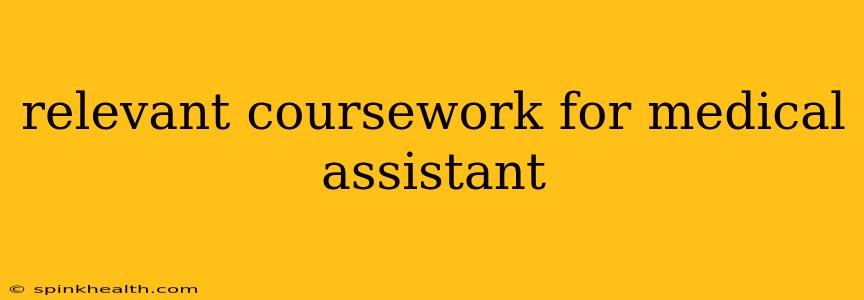Charting a Course to Success: Relevant Coursework for Aspiring Medical Assistants
The path to becoming a skilled and sought-after medical assistant is paved with relevant coursework. It's more than just memorizing medical terms; it's about mastering a blend of practical skills and theoretical knowledge. This journey, often involving a certificate or associate's degree program, is filled with fascinating challenges and rewarding experiences. Let's explore the essential components that make up a robust medical assisting curriculum.
What are the core courses in a medical assisting program?
A typical medical assisting program is a carefully crafted blend of classroom learning and hands-on experience. The core curriculum usually includes these key areas:
-
Medical Terminology: This is your foundation. Learning medical prefixes, suffixes, and root words unlocks the language of medicine, allowing you to understand charts, diagnoses, and treatment plans. Think of it as learning a secret code that opens doors to a deeper understanding of patient care.
-
Anatomy and Physiology: Understanding the human body – its systems, organs, and functions – is crucial. This course isn't just about memorization; it's about grasping how the body works, so you can better comprehend medical procedures, diagnoses, and patient conditions.
-
Medical Law and Ethics: Navigating the complex world of healthcare requires a strong understanding of legal and ethical responsibilities. This course covers patient confidentiality (HIPAA), informed consent, and other critical aspects of professional conduct.
-
Phlebotomy: This is a cornerstone skill. Learning how to draw blood accurately and safely is essential for many medical assistant roles. It requires precision, attention to detail, and a steady hand – skills refined through hands-on practice.
-
Electronic Health Records (EHR): The modern healthcare landscape is heavily reliant on technology. Mastering EHR systems is crucial, as it’s how you'll access, update, and manage patient information efficiently and accurately.
-
Clinical Procedures: This covers a range of essential procedures, including vital signs measurement, electrocardiograms (ECGs), injections, and wound care. It's where the theoretical knowledge transforms into practical abilities.
What other courses might be included in a medical assistant program?
Depending on the program and its focus, you might also encounter courses such as:
-
Pharmacology: Understanding medications – their uses, dosages, and potential side effects – is vital for assisting healthcare professionals.
-
Medical Billing and Coding: Efficiently processing medical claims and understanding medical codes (CPT, ICD) are critical skills for managing a healthcare practice's finances.
-
Microbiology and Infection Control: Maintaining a sterile environment and understanding infection control protocols are essential to prevent the spread of diseases.
Are there specific certifications or licensures needed after completing coursework?
While specific requirements vary by state, many employers prefer or require certification from organizations like the American Association of Medical Assistants (AAMA) or the American Medical Technologists (AMT). These certifications demonstrate your competence and adherence to professional standards.
What are some elective courses that could enhance my medical assistant career?
Electives can provide a specialization or enhance your skill set. Examples include:
-
Medical Office Administration: This enhances your administrative skills, making you more valuable to a clinic or practice.
-
Advanced Phlebotomy Techniques: Specializing in this area can make you highly sought after by labs or facilities requiring specific phlebotomy expertise.
-
Computerized Physician Order Entry (CPOE): Becoming proficient with CPOE systems can significantly improve workflow efficiency in a medical setting.
The journey to becoming a medical assistant is a rewarding one. By mastering the relevant coursework and supplementing it with practical experience and certifications, you’ll be well-equipped to embark on a successful and fulfilling career in the dynamic field of healthcare.

